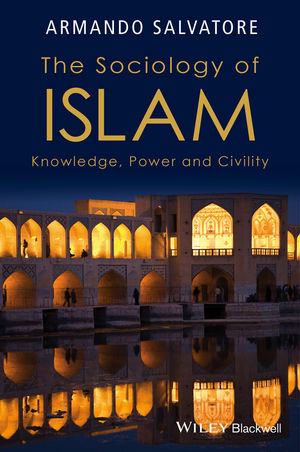
The Sociology of Islam
John Wiley & Sons Inc (Verlag)
978-1-119-10997-6 (ISBN)
The volume focuses on ideas of knowledge, power and civility to provide students and readers with analytic and critical thinking frameworks for understanding the complex social facets of Islamic traditions and institutions. The study of the sociology of Islam improves the understanding of Islam as a diverse force that drives a variety of social and political arrangements.
Delving into both conceptual questions and historical interpretations, The Sociology of Islam is a transdisciplinary, comparative resource for students, scholars, and policy makers seeking to understand Islam’s complex changes throughout history and its impact on the modern world.
Armando Salvatore is Professor of Global Religious Studies at McGill University, Montreal, and Professor at the Centre for Arab & Islamic Studies of the Australian National University, Canberra. His work as a social scientist emphasizes transregional comparison and explores the Islamic ecumene’s socio-political trajectories as well as transcultural interconnections. As a complement to The Sociology of Islam he is editing The Wiley Blackwell History of Islam. Among his previous works are Islam and the Political Discourse of Modernity (1997), Public Islam and the Common Good (edited with Dale F. Eickelman, 2004), The Public Sphere: Liberal Modernity, Catholicism and Islam (2007), and Islam and Modernity: Key Issues and Debates (edited with Muhammad Khalid Masud and Martin van Bruinessen, 2009).
Preface and Acknowledgments ix
Introduction 1
Knowledge and Power in the Sociology of Islam 1
Knowledge/Charisma vs. Power/Wealth: The Challenge of Religious Movements 18
Civility as the Engine of the Knowledge–Power Equation: Islam and ‘Islamdom’ 23
Part I Patterns of Civility
1 The Limits of Civil Society and the Path to Civility 43
The Origins of Modern Civil Society 43
Civil Society as a Site of Production of Modern Power 50
Folding Civil Society into a Transversal Notion of Civility 57
2 Brotherhood as a Matrix of Civility: The Islamic Ecumene and Beyond 73
Between Networking, ‘Charisma,’ and Social Autonomy: The Contours of ‘Spiritual’ Brotherhoods 73
Beyond Sufism: The Unfolding of the Brotherhood 85
Rewriting Charisma into Brotherhood 92
Part II Islamic Civility in Historical and Comparative Perspective
3 Flexible Institutionalization and the Expansive Civility of the Islamic Ecumene 105
The Steady Expansion of Islamic Patterns of Translocal Civility 105
Authority, Autonomy, and Power Networks: A Grid of Flexible Institutions 114
The Permutable Combinations of Normativity and Civility 118
4 Social Autonomy and Civic Connectedness: The Islamic Ecumene in Comparative Perspective 131
New Patterns of Civic Connectedness Centered on the ‘Commoners’ 131
Liminality, Charisma, and Social Organization 140
Municipal Autonomy vs. Translocal Connectedness 147
Part III Modern Islamic Articulations of Civility
5 Knowledge and Power: The Civilizing Process before Colonialism 165
From the Mongol Impact to the Early Modern Knowledge–Power Configurations 165
Taming the Warriors into Games of Civility? Violence, Warfare, and Peace 176
The Long Wave of Power Decentralization 189
6 Colonial Blueprints of Order and Civility 201
The Metamorphosis of Civility under Colonialism 201
Court Dynamics and Emerging Elites: The Complexification of the Civilizing Process 218
Class, Gender, and Generation: The Ultimate Testing Grounds of the Educational-Civilizing Project 226
7 Global Civility and Its Islamic Articulations 239
The Dystopian Globalization of Civility 239
Diversifying Civility as the Outcome of Civilizing Processes 251
From Islamic Exceptionalism to a Plural Islamic Perspective 260
Conclusion 271
Overcoming Eurocentric Views: Religion and Civility within Islam/Islamdom 271
The Institutional Mold of Islamic Civility: Contractualism vs. Corporatism? 278
From the Postcolonial Condition toward New Fragile Patterns of Translocal Civility 287
Index 295
| Erscheinungsdatum | 09.05.2016 |
|---|---|
| Verlagsort | New York |
| Sprache | englisch |
| Maße | 155 x 226 mm |
| Gewicht | 431 g |
| Themenwelt | Geschichte ► Allgemeine Geschichte ► Neuzeit (bis 1918) |
| Geisteswissenschaften ► Geschichte ► Regional- / Ländergeschichte | |
| Geisteswissenschaften ► Religion / Theologie ► Islam | |
| Sozialwissenschaften ► Soziologie | |
| ISBN-10 | 1-119-10997-3 / 1119109973 |
| ISBN-13 | 978-1-119-10997-6 / 9781119109976 |
| Zustand | Neuware |
| Haben Sie eine Frage zum Produkt? |
aus dem Bereich


